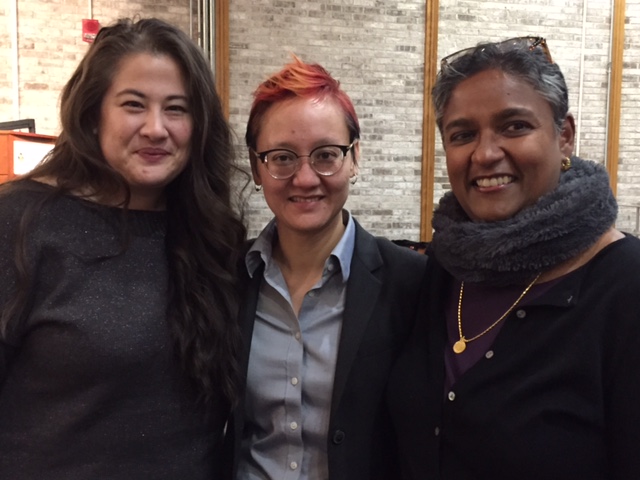In response to the tense state of reproductive justice, The Steinem Initiative hosted a panel on February 1 in Weinstein Auditorium entitled “Visions for Reproductive Justice: Resistance & Rebellion 2017 and Beyond.” The Steinem Initiative—which, according to Co-director Joyce Follett, aims “to improve public dialogue by adding new facts, stories, and perspectives” to social movements—collaborated with the Study of Women and Gender Department, the Jandon Center for Community Engagement, and the Design Thinking Initiative to bring three activists to discuss the challenges facing the movement in the new political climate.

The three panelists, from left to right: Sandra Criswell, Miriam Yeung, and Sujatha Jesudason.
As the three panelists were introduced, an emphasis was placed on their varying roles as leaders in the movement. Sujatha Jesudason is an organizer and policy advocate for her “think and do” tank CoreAlign. Sandra Criswell, an activist in the red-state of Oklahoma is an organizer and founder of the Take Root Conference. Miriam Yeung, a policy strategist, is executive director of the National Asian Pacific American Women’s Forum. The three gathered around a table on the Weinstein Auditorium stage to discuss the urgency of fighting for women’s movements in the current political climate. To contextualize the significance of their work, the panel began by each woman sharing their reaction to the election.
As the talk of the election continued, ideas arose on how the meaning of the reproductive justice movement was evolving. Jesudason admittedly remarked that she felt “bludgeoned by abortion” when discussing the movement, arguing that it needed to take up a wider range of issues to include aiding women at the intersection of multiple marginalized identities. To consider the issue further, she asked the audience to think of the women’s movement as one for “love, sex and family”—emphasizing that this can be misconstrued in our current wave of commodifying progressive values.
In addition, Miriam Yeung reflected on her role as a strategist for the Democratic National Committee (DNC). Chosen by the Initiative to be the 2017 Activist-in-Residence, she differed in her approach to the discussion by retelling her experience with a political party. Joking at the beginning of the panel about how she wanted to be invited to enjoy the Smith tradition of tea, Yeung clearly showed she has a lot of interesting anecdotes to share. Through surveys conducted with women for the DNC, she remarked on the challenges of confronting misogyny in political and personal spaces.
In a surprise turn of events, Yeung asked the audience to take a break and discuss their reflections and questions with a neighbor. Lively chatter ensued as audience members talked about their own roles, history, and hopes for the women’s movement. When the break was over, the panelists were asked questions regarding what has worked for the movement; what it means to be an obstructionist; the role of pro-life discussions in the movement, as well as the fight for justice in red states.
The lively and inspiring panel ended on a hopeful note as Sandra Criswell encouraged the audience to “figure out what [they] would cross the police line for.” In the current political climate, they argued, there was no time to remain ignorant. Their work, their discussion, and hopefully the future efforts of the audience members would encourage the resistance of 2017 and beyond.
